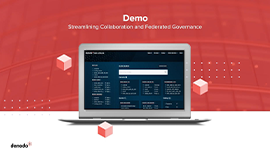What Is Data Democratization?
Data democratization is the process of making data accessible to all employees within an organization, regardless of their technical expertise. It removes barriers to data access and promotes a culture in which data-driven decision-making is the norm.
Why Is Data Democratization Important?
Data democratization empowers organizations by enabling non-technical users to leverage data for insights and decision-making. Key benefits include:
- Faster Decision-Making: Reduces dependence on data teams for basic analytics
- Increased Innovation: Encourages data-driven experimentation and problem-solving
- Enhanced Collaboration: Enables cross-functional teams to make informed decisions
- Greater Data Literacy: Promotes a culture of data understanding across the organization
- Competitive Advantage: Helps businesses respond quickly to market changes, with faster insights
How Data Democratization Works
Data democratization involves implementing strategies and technologies that simplify data access. The process typically includes:
- Data Access Policies: Defining permissions and data governance rules to enable access security
- Self-Service Analytics Tools: Deploying BI and analytics platforms that enable non-technical users to explore data
- Data Catalogs: Providing searchable repositories for easy data discovery
- Data Literacy Training: Educating employees on how to use and interpret data effectively
- Data Governance Frameworks: Facilitating compliance while improving accuracy and security, all while expanding data access
Key Components of Data Democratization
- User-Friendly Data Platforms: Simplifies interaction with complex datasets
- Role-Based Access Control (RBAC): Enables secure, appropriate data access
- Automated Data Preparation: Reduces the need for manual data cleansing and transformation
- Collaboration Tools: Enables teams to effortlessly share and discuss insights
- AI and Machine Learning Integration: Provides automated recommendations and predictive insights
Applications of Data Democratization
- Business Intelligence (BI): Enables business users to generate reports without IT intervention
- Marketing Analytics: Enables marketers to analyze customer behavior in real time
- Financial Planning and Analysis: Empowers finance teams to create forecasts and track KPIs
- Product Development: Helps teams iterate based on real-world user data
- Human Resources: Supports HR teams in workforce planning and employee engagement analysis
Best Practices for Implementing Data Democratization
- Develop a Data Strategy: Align democratization efforts with business objectives.
- Ensure Data Governance: Balance accessibility with security and compliance.
- Promote Data Literacy: Train employees on data interpretation and responsible usage.
- Encourage a Data-Driven Culture: Foster a mindset in which decisions are backed by data.
- Enable Continuous Monitoring and Improvment: Regularly assess data access policies and tools for improvements.
Challenges in Data Democratization
- Security and Privacy Risks: Keeping in compliance with data protection regulations
- Data Quality Issues: Maintaining data accuracy and consistency
- Resistance to Change: Overcoming reluctance to adopt data-driven decision-making
- Scalability Concerns: Managing increasing data volumes while maintaining data delivery performance
Future Trends in Data Democratization
- AI-Driven Data Insights: Automating data discovery and interpretation
- Self-Service Data Platforms: Expanding access to intuitive, no-code analytics tools
- Embedded Analytics: Integrating data insights into everyday business applications
- Federated Data Governance: Enabling decentralized data access with centralized oversight
Real-Time Data Access: Increasing the availability of up-to-date, on-demand insights.






